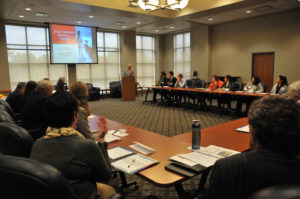By Lindsay Steele
The Catholic Messenger
DAVENPORT — The Caring Cities Campaign, a grassroots group formed in July in response to the tens of thousands of unaccompanied minors entering the United States from Central America, has shifted focus from relocation to legal representation.

Lawyers applaud a call to action from Davenport Mayor Bill Gluba at an immigration law training session Oct. 17 at St. Ambrose University in Davenport. The training, sponsored by Caring Cities Campaign, is intended to encourage and teach lawyers how to represent unaccompanied minors on a pro-bono basis, increasing their chances of being able to stay in the United States.
The group originally formed at the request of Davenport Mayor Bill Gluba to develop sheltering opportunities for the unaccompanied minors in Iowa. However, as shelter opportunities became available in other places, the group reevaluated what it could do to help the unaccompanied minors. One of the major additional needs was access to pro-bono (free) legal representation, said Nora Dvorak, the group’s coordinator.
Dvorak, who also serves as diocesan immigration issues coordinator, explained that all unaccompanied minors are entitled to a court hearing to explain why they should be allowed to stay in the United States, but only about one-third have attorneys to help lead them through the complicated judicial process.
“Of the two-thirds who don’t have an attorney, the likelihood they will be able to remain is slim,” she said. Of those represented, 47 percent will be allowed to stay, as opposed to 10 percent of those who are unrepresented.
With assistance from the University of Iowa College of Law, Caring Cities has begun offering training for attorneys who wish to represent unaccompanied minors pro bono in immigration proceedings. The first training session took place Oct. 17 at St. Ambrose University in Davenport, with about 20 Quad-Cities-area lawyers present. The event was free to the lawyers, none of whom currently represent unaccompanied minors in the legal system.
Gluba spoke to the group before the training. He explained that the U.S. government found other shelter locations – many on unused military bases. So he asked government officials what else Davenport could do to help. “They need attorneys,” he was told.
Stella Elias, an immigration law professor at the University of Iowa College of Law, said most unaccompanied minors come from El Salvador, Guatemala and Honduras. About 60,000 unaccompanied minors have crossed the border this year, as opposed to 25,000 in 2013. The influx is beginning to show signs of slowing, likely because of the change in seasons and government campaigns discouraging would-be immigrants, she said. Most of the undocumented minors in Iowa live with family members as they await court hearings.
Dan Vondra, an immigration attorney who often works with families in the Davenport Diocese, was among the presenters. Displaying PowerPoint slides with numerous scenarios for undocumented minors, he said immigration cases are complicated and that judges tend to be “nicer” in pro-bono cases.
“It can be a land mine” without full understanding, Vondra said. He described the Oct. 17 training session as a first step for interested attorneys.
Lawyers attending the training came from both sides of the Mississippi River and from various religious backgrounds. Dvorak said the attendees gave high ratings for the training, and several agreed to become pro-bono attorneys for unaccompanied minors. The biggest compliment she received was from a criminal defense attorney who said this was the best continuing legal education training he had ever attended.
She added that the group hopes to plan similar training in Des Moines and Dubuque.








